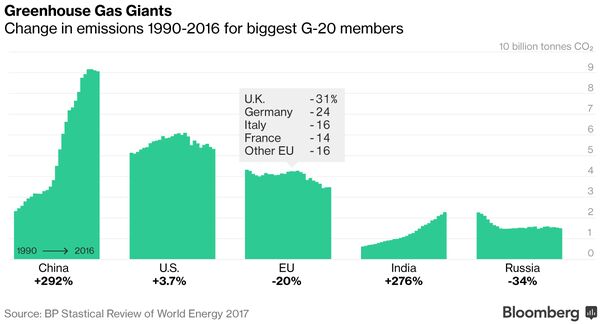Macron Woos Trump With Parisian Splendor in European Lesson
EghtesadOnline: Donald Trump famously said in February that “Paris is no longer Paris.” After Emmanuel Macron showed him the town and met with him at the gilded Élysée Palace, the American president ladled praise on the French capital and the country’s 39-year-old leader.
He even suggested that his opposition to the Paris climate accord isn’t set in stone, Bloomberg reported.
It was Macron’s fourth meeting with Trump since his election in May. The two have acrimoniously clashed over climate change and Macron has made not-so-hidden allusions to his opposition to building “walls,” but in this latest encounter they stressed their common positions, from trade to terrorism. Preceding the visit, French officials laid out their strategy to approach Trump: hold your ground where you disagree, and pivot to areas of agreement. And don’t forget his love of pomp and the military.
As both leaders prepare to attend the Bastille Day parade together on Friday, that strategy appears to have worked.
“You have a great president, and I think you’re going to have a very peaceful and beautiful Paris, and I’m coming back,” Trump said on Thursday at a news conference with Macron.
European ‘Adjustment’
Macron had never held elective office before winning France’s presidency, and all his previous government positions have been in the economic domain. But he’s quickly put a stamp on international affairs, lecturing Russia’s Vladimir Putin about meddling in France’s election during a May meeting in Versailles, and calling Trump last month to say France would join the U.S. in any air strikes should the Syrian regime resort again to using chemical weapons.
“What we’ve witnessed over the last month or so since Trump’s first trip to Europe is an adjustment in how Europe is going to deal with Trump,” said Charles Kupchan, a senior fellow at the Council for Foreign Relations who was the senior director for European affairs on the National Security Council under Barack Obama. “Macron gets stature. He’s raising France’s profile and its game after a period in which many French voters were profoundly apathetic about the French presidency.”
In Europe, he’s pushing labor liberalization and tax cuts to win Germany’s confidence in his ability to make the French economy more competitive. Macron hosted German Chancellor Angela Merkel just hours before Trump and won assurances from her that she’s willing to consider greater solidarity within the euro zone.
Paris, Not Pittsburgh
Even Trump’s position on climate change appeared to soften after spending the day with the French president. Trump announced the U.S. withdrawal from the Paris climate accord shortly after Macron’s election, saying that he represents the citizens of “Pittsburgh, not Paris.” The 39-year-old Macron responded by inviting U.S. climate scientists to relocate to France and mocking Trump’s campaign slogan with a website called “Make Our Planet Great Again.”
At the news conference, Trump was asked whether he would reconsider withdrawal from the Paris deal.
“Something could happen with respect to the Paris accord,” he said. “We’ll see what happens. We’ll talk about that over the coming period of time. If it happens, that’ll be wonderful, and if it doesn’t, that’ll be OK too.”
Macron said he “respects” that withdrawal from the accord was part of Trump’s campaign platform.

Military Alliance
Macron sought to stress that military matters and anti-terrorism cooperation remain the bedrock of French-U.S. relations. Both leaders noted that the U.S. and France are each other’s oldest allies: troops of both countries will march on Friday to commemorate the 100th anniversary of the U.S.’s entry into World War I.
The U.S. provides logistical and intelligence support to French anti-militant operations in the Sahel region of Africa, and French warplanes, special forces and an artillery unit are part of the U.S.-led coalition against Islamic State in Iraq and Syria.
“We represent countries that have been allies forever,” Macron said at their news conference. “No matter what our functions, our histories go beyond us. The bonds between our countries are bigger than us.”
Their positions on trade aren’t even as far apart as presumed, though Macron won his election on a free-trade platform while Trump promised to protect U.S. industry.
“France and the U.S. want to be able to take the necessary measures within the context of free trade that can help us protect the sectors where we are active,” Macron said, though he declined to directly address U.S. threats to limit steel imports and European Union warnings of retaliation if it does. “We want to work together to develop efficient measures to combat dumping wherever it takes place.”
Macron and their wives then held a private dinner at the Jules Vernes restaurant in the Eiffel Tower, from where they could admire a view of Paris. Chef Alain Ducasse canceled a planned event in Beijing, and flew back overnight from Hong Kong to be present in the kitchen. The menu included a selection of pate, Dover sole and filet of beef served with brioche, followed by hot chocolate souffle.
As the night ended, it was clear that Trump’s mysterious friend “Jim,” whom he described in his February speech to conservative activists as a once-frequent visitor to Paris who recently discontinued his trips because of the threat of terrorism, was nowhere to be found.
“My overall impression was that president Macron sought to emphasize the commonalities and not to harp on the known differences between him and the president on a whole bunch of issues,” said Jeff Rathke, a senior fellow and deputy director of the Europe Program at the Center for Strategic and International Studies. The visit “is a success for President Macron, regardless of what their disagreements are.”


